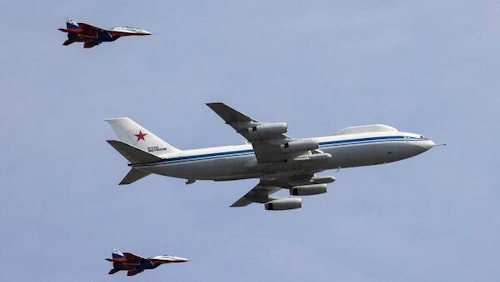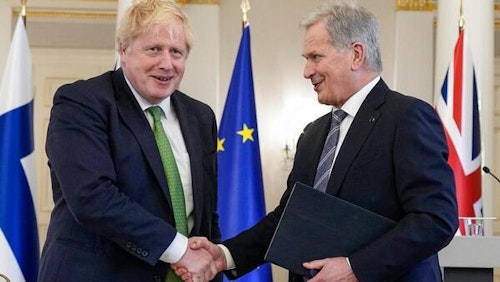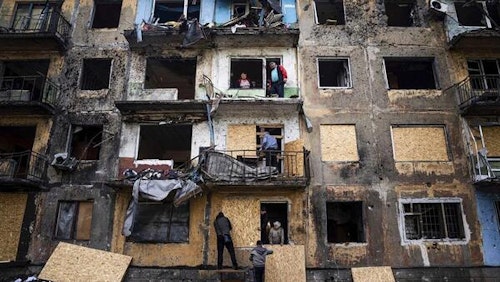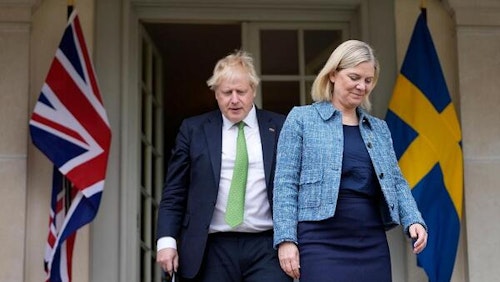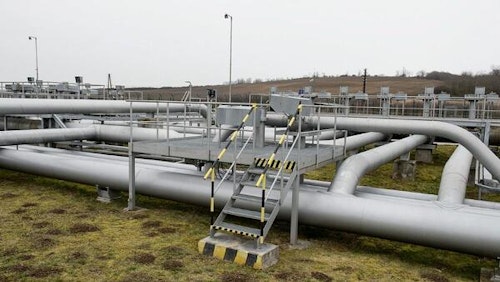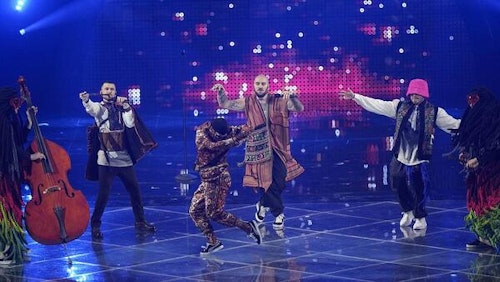The 21-year-old is accused of killing an elderly Ukrainian man during the first few days of the Russian invasion.
Follow events as they unfolded on Wednesday in our live blog below, or click the video player above to watch the latest updates:
 ADVERTISEMENT
ADVERTISEMENT
 ADVERTISEMENT
ADVERTISEMENT

 ${title}
${title}
Live ended
Wednesday's key developments
Ukraine’s top prosecutor disclosed plans Wednesday for the first war crimes trial of a captured Russian soldier.
Boris Johnson signs a deal with Sweden and Finland to offer military support in case they're attacked.
A new report finds direct and indirect losses from the war range from $564 billion to $600 billion (€568 billion), and the cost of rebuilding would eclipse WWII's Marshall Plan.
Russian ship carrying Ukrainian grain reaches Syria.
Russia-occupied Kherson will ask Vladimir Putin to annex the region, says Russia-installed official
Ukraine to shut off a third of Russian gas transitting to Europe, citing 'force majeure'
Pussy Riot member flees Russia, evading police dressed as a food deliver person.
Across Europe's capitals, Russian diplomats are getting a distinctively cold shoulder, ranging from diplomatic expulsions to protests by individual citizens and service denials by companies.
Russia could dominate north-western Black Sea if it takes contested Snake Island, says Britain's Ministry of Defence.
Ukrainian foreign minister tells Politico that war would look very different if they'd received military aid sooner. “This is where all of us lost time and allowed Putin to gain what he shouldn’t have,” he said.
The US House of Representatives has overwhelming backed a new, $40 billion Ukraine aid package.
That's our live blog coming to a close for Wednesday evening.
We're back early on Thursday morning with all the latest developments.
Ukraine to hold first war crimes trial of captured Russian soldier
Ukraine’s top prosecutor disclosed plans Wednesday for the first war crimes trial of a captured Russian soldier.
Prosecutor General Iryna Venediktova said her office charged Sgt Vadin Shyshimarin, 21, in the killing of an unarmed 62-year-old civilian who was gunned down while riding a bicycle in February, four days into the war.
Shyshimarin, who served with a tank unit, was accused of firing through a car window on the man in the northeastern village of Chupakhivka. Venediktova said the soldier could get up to 15 years in prison. She did not say when the trial would start.
Venediktova’s office has said it has been investigating more than 10,700 alleged war crimes committed by Russian forces and has identified over 600 suspects.
Many of the alleged atrocities came to light last month after Moscow's forces aborted their bid to capture Kyiv and withdrew from around the capital, exposing mass graves and streets and yards strewn with bodies in towns such as Bucha. Residents told of killings, burnings, rape, torture and dismemberment.
Volodymyr Yavorskyy of the Center for Civil Liberties said the Ukrainian human rights group will be closely following Shyshimarin's trial to see if it is fair. “It’s very difficult to observe all the rules, norms and neutrality of the court proceedings in wartime,” he said.
(AP)
Inside the 'Flying Kremlin': What does Russia's 'Doomsday plane' mean for the war in Ukraine?
The Flying Kremlin is a Russian-made Ilyushin Il-80 plane, and made its first appearance in over a decade at Moscow’s Victory Day parade on Monday.
The aircraft is designed specifically to protect Russian leadership at all costs through a worst-case scenario.
Despite its size, the plane has no windows - except the cockpit - to ensure maximum protection through trying atmospheric and weather conditions - or a nuclear blast.
Read more at our story here:
Casualties reported from Russia, in alleged Ukrainian strikes
One person has been killed and three others wounded in southwestern Russia after shelling from Ukraine, the Russian governor of the affected region said Wednesday.
"At the moment, one person has lost his life, he died in the ambulance, and there are three injured," Belgorod region governor Vyacheslav Gladkov said on the Telegram messaging app.
He said the situation was "the most difficult" his region had seen since Russian President Vladimir Putin sent troops into Ukraine on 24 February.
Gladkov accused Ukraine of targeting the village of Solokhi, saying one house had been partially destroyed.
Authorities in Ukraine's border regions regularly accuse Kyiv's forces of launching attacks against Russia.
In April, Mr Gladkov accused Ukrainian helicopters of attacking a fuel depot in Belgorod.
(AFP)
British Prime Minister Boris Johnson has been in Sweden and Finland on Wednesday, and promises to defend the Nordic nations in case of any aggression.
Read more in our story here:
Italian sites targeted by pro-Russian hackers
Several Italian websites, including those of the Ministry of Defence and the Senate, were targeted by a group of pro-Russian hackers, according to media reports in Italy on Wednesday evening.
Access to these sites was however restored a few hours later.
The defence ministry website said it was "under maintenance" but the ministry later said in a statement that it was a "long planned maintenance operation".
The Senate website, which was inaccessible in the early evening, was operational after 18:00 GMT.
"The attack, claimed by the pro-Russian collective 'Killnet', has not compromised the infrastructure for the moment, according to our information, but has complicated access to various sites," wrote the daily Corriere della Sera in its online edition.
Several other institutions or companies were also attacked, including the Higher Institute of Health (ISS), but all the sites have resumed normal operation.
According to the AGI agency, the hackers also tried to attack the Eurovision website, without success.
Last August, Lazio, the region of Rome, suffered a large-scale attack, the main consequence of which was that bookings for the anti-Covid vaccine were stopped.
(AFP)
WHO members vote for Russia office to be moved
Members of the World Health Organization’s European region have condemned Russia’s war in Ukraine, which could result in moving one of the agency’s offices out of Russia and suspending all meetings there until Moscow pulls its troops out of Ukraine.
In a statement after a resolution passed on Tuesday, countries in the WHO’s European region said they were “highly concerned” over the situation in Ukraine that was “triggered by the unprovoked and unjustified military aggression by the Russian Federation against Ukraine.” More than 40 countries, including France, Germany, Italy, Sweden and the UK, voted in favor of the statement, while Russia, Belarus and Tajikistan voted against it.
The resolution said the WHO should do “whatever is possible to support the government in Ukraine” and to consider the possible relocation of the United Nations health agency’s Moscow-based European Office for the Prevention and Control of Non-communicable Diseases to another country. It also asked the WHO’s European director to consider temporarily suspending all meetings in Russia until the country withdraws its military forces from Ukraine.
(AP)
Italian PM pushes for talks to end Ukraine war
Ukraine’s leaders must start shaping their terms for an acceptable peace deal, especially in light of Russia’s surprising failure to win its war outright, Italy’s prime minister said Wednesday.
When Russia first launched its invasion of Ukraine, “we thought there was a Goliath and a David,” Mario Draghi told reporters at a news conference in Washington. But “what seemed like an invincible power has proved” not to be, Draghi said, referring to Russian forces’ inability to overcome the defense mounted by Ukraine’s military, with heavy Western backing.
Draghi spoke after meeting with President Joe Biden on Tuesday. Draghi says he urged Biden to push to get all key players, including the United States and Russia, into talks to end the war.
But any rush to close a peace deal that leaves Ukrainians angry and resentful risks a return to fighting, the Italian leader said Wednesday.
“We have to remove any thought that we can reach an imposed peace,” Draghi said. “That is a recipe for disaster.”
(AP)
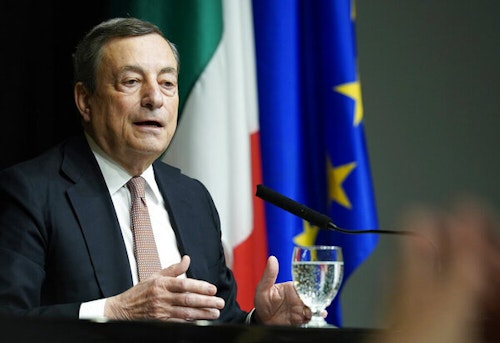
UK PM Boris Johnson signs defence assistance agreement with Finland
Following his visit to Sweden where he signed an agreement pledging UK assistance in case the country was to come under attack by Russia, Prime Minister Boris Johnson made the same commitment to Finland in Helsinki on Wednesday.
Watch the live press conference with Johnson and Finnish President Sauli Niinistö here:
Romanian journalists arrested in Transnistria, foreign ministry says
Romania’s foreign ministry says that two Romanian journalists were detained Tuesday in the Russia-backed breakaway region of Transnistria in neighbouring Moldova.
The two journalists were detained by security forces in Transnistria’s de facto capital of Tiraspol and released hours later after diplomatic efforts from both Romania and Moldova, the ministry said Wednesday in a statement.
“(The) Romanian diplomatic mission in Chisinau was not informed in advance about the intention of the two journalists,” it said, adding that the “so-called Transnistrian authorities” recently banned foreign journalists from entering the region.
The incident follows a series of mysterious attacks in the Russia-backed region in recent weeks that have alarmed officials in Moldova’s capital, Chisinau.
German government dismisses Nordstream 2 suggestions
The German government has dismissed suggestions that it might activate the Nord Stream 2 pipeline from Russia to Germany to compensate for reduced flows via Ukraine.
A spokeswoman for the Energy Ministry said Wednesday that Germany is currently receiving a quarter less gas through Ukraine after Ukrainian authorities shut down a pipeline saying it no longer controls a key compressor station that’s in Russian hands.
Annika Einhorn, the ministry spokeswoman, said the shortfall is being partly compensated for through increased supplies from Norway and the Netherlands.
“Nord Stream 2 has really died after Russian attacked Ukraine and nobody is thinking about switching to that,” she said.
She also noted that the majority of Russian gas reaches Germany through a sister pipeline, Nord Stream 1, rather than via Ukraine.
Germany has pledged to end imports of Russian natural gas by 2024 at the latest.
(AP)
Cost of Ukraine's reconstruction will eclipse the entire Marshall Plan
Ukraine's economy is collapsing under the weight of Russia's invasion.
A recent report by the Kyiv School of Economics revealed that direct and indirect losses from the war range from $564 billion to $600 billion (€568 billion), and could increase even further as the conflict drags on.
By comparison, the US-led Marshall Plan that brought Western Europe out of the devastation after World War II had an original price tag of $13 billion, equivalent to over $155 billion in current prices.
Watch more at our video here:
Finland: PM and President to state NATO membership opinions on Thursday
Finnish public broadcaster Yle says both Prime Minister Sanna Marin and President Sauli Niinistö will announce their personal opinions on NATO membership on Thursday, with statements due to be released at 10am EET.
This is the week the Nordic nation -- which is closely aligned militarily with NATO, but not actually a full member -- lines its political procedures up in a row to make a NATO membership application.
On Tuesday the defence committee in parliament concluded that Finland's security situation would be better inside NATO; with Marin and Niinistö expected to say the same. Marin's party, the Social Democrats, will meet on Saturday and should also endorse a membership bid, an historic shift in position for the centre-left party.
The 199 voting members of the Finnish parliament will also have to support a membership bid, and although it's not know at this stage whether a simple majority, or a two-thirds majority will be required, there seem to be enough members of parliament who support NATO membership to meet the higher threshold.
Public support in Finland has also jumped sharply in favour of joining NATO since Russia launched an invasion of Ukraine on 24 February. Before then, support for NATO membership had hovered around 25% for the best part of two decades. But in the latest opinion polls out this week, a record high of more than 70% of the public say they would back a NATO membership bid.
That figure is expected to rise higher still, once the Prime Minister and President announce their positions.
(Euronews)
Czech citizens authorised to fight in Russia
Czech President Milos Zeman on Wednesday gave the go-ahead to around 100 Czech citizens to help Ukraine's military fight Russian forces there, his spokesman said.
Once fiercely pro-Russian, Mr Zeman changed his stance after Russia invaded Ukraine on 24 February.
Czech law prohibits citizens of that country from fighting abroad, but the president's decision was also endorsed by Prime Minister Petr Fiala.
The two politicians had already agreed in March not to punish Czechs who go to war alongside Ukrainian troops.
Soon after, President Zeman called his longtime ally, Russian President Vladimir Putin, "crazy".
"On Wednesday, he signed, at their request, a decision approving the membership of the Ukrainian Armed Forces of 103 citizens," his spokesman Jiri Ovcacek said in a statement.
Since the beginning of the war, foreign fighters of different nationalities have been fighting on the Ukrainian side following the call made by President Volodymyr Zelensky.
The Czech government has also provided military aid of around three billion crowns (118 million euros) to Ukraine.
(AFP)
Sergei Lavrov says Russia doesn't want war in Europe
Russian Foreign Minister Sergei Lavrov said on Wednesday that his country did not want war in Europe, but that Western countries were keen to see Russia defeated in its military campaign in Ukraine.
"If you are worried about the prospect of war in Europe - we do not want that at all," Lavrov said at a news conference in Muscat after talks with his Omani counterpart.
"But I draw your attention to the fact that it is the West that is constantly and persistently saying that in this situation, it is necessary to defeat Russia. Draw your own conclusions."
(Reuters)
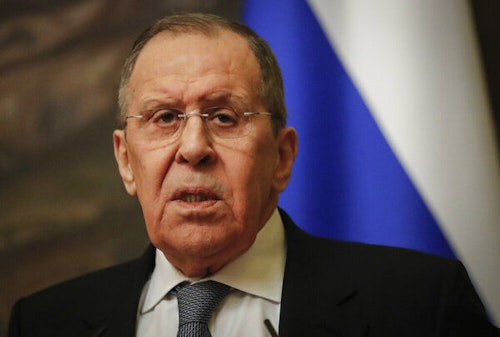
UK will defend Sweden if attacked, Boris Johnson promises
The British PM is visiting Sweden and Finland and is expected to sign a similar agreement in Helsinki, as both countries consider whether to apply for NATO membership.
Read more at our story here:
Shelling damages Ukrainian warehouse storing ammonium nitrate
Local authorities in the eastern Ukrainian city of Sloviansk told residents to go out as little as possible and to keep their windows shut on Wednesday because Russian shelling had damaged a warehouse storing ammonium nitrate nearby.
Ammonium nitrate is most commonly used as a source of nitrogen for fertiliser and it can cause respiratory problems if inhaled in large quantities. Russia did not immediately comment on the report and Reuters could not verify it.
"We emphasise that there is no direct threat to the lives of the inhabitants of the Sloviansk community," the Sloviansk city authorities said, adding that the warehouse was in the Kramatorsk area.
(Reuters)
Russia has enough buyers for its energy resources, FM
Russia has enough buyers for its energy resources outside of Western countries, Russian Foreign Minister Sergei Lavrov said on Wednesday, as European Union countries try to sharply reduce their reliance on Russian oil and gas.
"Let the West pay more than it used to pay to the Russian Federation, and let it explain to its population why they should become poorer," Lavrov said at a news conference in Muscat after talks with his Omani counterpart.
Lavrov also said that Moscow did not want war in Europe. "If you are worried about the prospect of war in Europe - we do not want that at all," he said.
"But I draw your attention to the fact that it is the West that is constantly and persistently saying that in this situation, it is necessary to defeat Russia. Draw your own conclusions."
(Reuters)
UN concentrating efforts on improving civilians’ living conditions, helping with evacuations from war zones
The United Nations chief says that while it is clear that “at the present moment there are no immediate chances of a peace agreement or immediate chances for local cease fire” in Ukraine, the organisation is still working on improving the difficult circumstances of the people suffering from the war.
Secretary-General Antonio Guterres said Wednesday during a visit to Vienna that the UN has concentrated all its diplomatic efforts on improving the civilians’ living conditions and is helping with the evacuations of Ukrainians from war zones in cooperation with the International Committee of the Red Cross.
Guterres told reporters after a meeting with the Austrian President Alexander van der Bellen that “there is still a lot we can do in diplomacy to save lives and to improve the humanitarian situation in the conflict.”
(AP)
Russian ship with Ukraine grain reaches Syria
Satellite photos analysed by the Associated Press show that a Russian ship believed to be carrying stolen Ukrainian grain has docked in Syria.
The photo taken Tuesday by Planet Labs PBC showed the Russian-flagged Matros Pozynich at dockside in Latakia, Syria. The ship seen in the photo matched known characteristics of the bulk carrier, as well as its dimensions.
The ship turned off its transponders nearly a week ago off the island of Cyprus in the Mediterranean Sea.
Samir Madani, the co-founder of the online research firm TankerTrackers.com, also told the AP that he believed the ship docked in Latakia was the Matros Pozynich, based on its dimensions and last-known position.
Ukraine has alleged that the ship had 27,000 tons of grains Russia stole from the country. It alleged Russia initially tried to ship the grains to Egypt, which refused to take the cargo. Ukrainian diplomats had been asking nations not to accept the grain.
(AP)
'We'll ask Putin to annex Kherson'
Authorities in Russian-occupied Kherson are planning to ask Vladimir Putin to annex the region, a Russia-installed official said on Wednesday.
"There will be a request to make the Kherson region a full-fledged constituent of the Russian Federation," said Kirill Stremousov, deputy head of the regional military and civilian administration in Kherson, according to the TASS news agency.
The Kherson region -- located just north of Crimea, which was annexed by Moscow in 2014 -- is essential for supplying the peninsula with water.
Moscow used a disputed referendum to justify its annexation of Crimea.
But Stremousov said there would not be a vote in Kherson. Instead "there will be a decree based on an appeal from the Kherson regional leadership to the Russian president, and there will be a request to include the region into a proper region of the Russian Federation", he added.
Taking control of Kherson, a city in southern Ukraine, and much of the surrounding region early on in the war has been arguably Russia’s most significant gain.
Ukrainian officials have speculated that Russia plans to stage a referendum in the region to declare its independence, similar to the ones that took place in eastern Donetsk and Luhansk regions in 2014. Moscow recognized the self-proclaimed Donetsk and Luhansk republics two days before invading Ukraine and used it as a pretext to send troops to its ex-Soviet neighbour.
Zelenskyy thanks US House for supporting aid package
Ukrainian President Volodymyr Zelenskyy has posted a message on Twitter thanking members of the US House of Representatives for the quick passage of a bill that would see $40 billion in aid go to Ukraine.
The bill passed by a 368-57 margin on Tuesday, and provides $7 billion more than President Joe Biden’s initial request, with the increase divided equally between defense and humanitarian programs. It will now go before the US Senate.
Pussy Riot band member flees Russia
A member of the Russian protest group Pussy Riot, Maria Aliokhina, has fled Russia, claiming in an interview with the New York Times in Lithuania that she was able to shake her police monitor by disguising herself as a meal delivery person.
The activist thus joins thousands of Russians who have left the country since the start of the Russian offensive in Ukraine.
Last September Aliokhina was sentenced to one year of "restrictions" on her freedom, which included judicial controls, night curfews and a ban on leaving Moscow, for having called for a demonstration against the arrest of Russian opposition leader Alexei Navalny.
At the end of April the Russian justice system toughened those measures, replacing them with a prison sentence.
In an interview with the New York Times, Maria Aliokhina, 33, said on Wednesday that she had managed to escape Moscow disguised as a meal delivery girl, leaving her mobile phone behind to act as a decoy and prevent the police from tracking her.
She then crossed the border into neighboring Belarus and a week later was able to cross into Lithuania, after several attempts.
Read the full interview here.
Russian diplomats spurned in Europe's capitals
Russian diplomat Sergiy Andreev was feeling unwelcome on the streets of Warsaw even before protesters doused him with red liquid thrown in his face at short range this week.
Soon after Russia's invasion of Ukraine, Andreev, who is Moscow's ambassador in Poland, found the embassy bank accounts had been frozen. Attempts to meet with Polish officials for any level of diplomatic discussion were impossible, he said.
His regular barber refused to cut his hair. Insurance companies denied coverage for embassy cars.
"We are practically isolated," he told Reuters.
Across Europe's capitals, Russian diplomats are getting the cold shoulder, ranging from diplomatic expulsions by governments, to protests by individual citizens, and service denials by companies.
European Union governments have expelled at least 400 Russian diplomats and support staff. Warsaw has seized a building linked to the Russian embassy, and Oslo renamed a street in front of the Russian mission "Ukraine Square."
The diplomats' tribulations are not comparable to the destruction of the war or the broader Western response, but they are a conspicuous example of the depth of feeling against the invasion, and have hit home in Moscow.
Public protests have prompted Russia's foreign ministry to warn diplomats to think twice when they venture out, after embassies were defaced by red paint in Rome, Sofia and Prague. In London, protesters piled cookware and appliances in front of Russia's mission in April, in reference to reports of Russian looting in Ukraine.
"There are attacks, practically terrorist acts against our institutions and against the physical security of diplomats," Russian Foreign Minister Sergei Lavrov told Rossiya 24 television.
In Poland, Andreev was at Warsaw's Soviet Military Cemetery on Monday to lay flowers to mark the 77th anniversary of the victory over Nazi Germany when he was surrounded by protesters - some holding Ukrainian flags and chanting "fascists" at the Russian delegation - before a woman hurled a lumpy red liquid into his face.
The Russian foreign ministry said it had lodged a strong protest with Polish authorities, which it accused of "practically conniving" with the protesters.
As in Warsaw, the Russian embassy in Paris has been running low on cash, with Moscow instructing diplomats there to cut spending to a minimum, according to a diplomatic source from a country that has not imposed sanctions on Russia and continues to engage with the embassy.
In Lithuania, two main banks have or will cut money transfers to and from Russia and Belarus, and, like in Poland, insurance firms have refused to insure embassy cars.
The Russian embassy in Lithuania's capital Vilnius confirmed its troubles.
"The embassy has recently been facing a number of problems in the banking and insurance sector, as well as with the fulfilment by certain companies of their obligations under existing contracts," said press secretary Alexander Kudryavtsev.
(Reuters)
Russian troops leaving behind ‘deadly traps’, says Kharkiv governor
Kharkiv's governor, Oleg Synegubov, claims that Russian troops have left behind "deadly traps" as they've pulled back from some areas around the city, and urged residents to stay in their shelters rather than rush out to liberated settlements.
"The enemy is insidious and is doing everything to hurt as many civilian Ukrainians as possible," Synegubov wrote on Telegram.
Kharkiv, Ukraine's second-largest city, has been the focus of intense Russian shelling over the past month and a half. On Tuesday, Ukrainian officials claimed that Ukrainian troops had retaken several towns around the city.
Russian gas flows to Europe via Ukraine, but at a lower rate
Russian gas producer Gazprom said it continues shipping gas to Europe via Ukraine, with volumes on Wednesday seen at 72 million cubic metres (mcm), down from 95.8 mcm on Tuesday.
Gazprom did not say if that level was in line with requests from European clients.
Volumes have declined after nominations for Russian gas transit via Ukraine at the Sokhranovka entry point for May 11 fell to zero, according to data from Ukraine's gas pipeline operator, following Kyiv's warning of shutting down supplies via that route.
(Reuters)
Zelenskyy pays tribute to Ukraine's first president, who died Tuesday
Ukraine's President Volodymyr Zelenskyy has paid tribute to the country's first president, Leonid Kravchuk, who died at the age of 88 on Tuesday.
"Leonid Kravchuk knew what freedom costs, and with all his heart he wanted peace for Ukraine. I’m sure we will implement it. We will achieve our victory and our peace," he said.
Kravchuk led Ukraine to independence following the collapse of the former Soviet Union, and served as its first president until 1994.
Overnight clash reports come rolling in
According to the latest operational update of the general staff of Ukraine’s armed forces, Ukrainian forces in the Donetsk and Luhansk oblast repulsed twelve enemy attacks on Tuesday, “destroying twelve tanks, four artillery systems, nineteen units of armoured combat vehicles, seven cars and two units of special engineering equipment.”
Meanwhile, in its own briefing this morning, the Russian Defence Ministry said that during the night Russian operational-tactical and army aviation hit 93 Ukrainian assets, including two command posts, 69 areas of manpower and military equipment concentration, and three ammunition depots.
Missile troops and artillery units also hit 407 areas of manpower and military equipment concentration, it said, destroying 13 command posts, four positions of Osa-AKM anti-aircraft missile systems and 14 ammunition depots.
None of the claims could be independently verified.
Swedes increasingly in favour of NATO membership
According to the Guardian's diplomatic editor, Patrick Wintour, support in Sweden for the country joining NATO continues to grow, with a survey by Sweden Aftonbladet showing 61% of Swedes in favour, up 4% since April. 20% are opposed to joining.
British Prime Minister Boris Johnson is set to visit both Sweden and Finland later today, to discuss the war in Ukraine and the "security of Europe more broadly," according to his official spokesman.
As things stand, Sweden is expected to submit a joint application with Finland next week, with discussions among political parties ongoing.
Western allies begin to weigh up costs of rebuilding Ukraine
Even as the destruction in Ukraine continues, Western governments that have backed the country in its war against Russia are beginning to weigh up the costs and planning that will be needed for a postwar reconstruction effort that will rival anything seen since the second world war, writes the Financial Times.
The project, officials warn, is going to be complex and costly, running into hundreds of billions of euros, and it will have to go far beyond simply rebuilding bridges and municipal buildings.
In fact, the FT writes, it will entail the wholesale reconstruction of Ukraine’s private sector and reforms to an economy that, after suffering from eight years of simmering conflict, is in line for a 45% crash in output this year.
It will also depend on whether Russia will ever pay for any of the damage.
Read the full article here (paywall).
The EU appears no closer to a Russian oil embargo
Unlike other rounds of sanctions against Moscow approved swiftly by member states, the EU appeared no closer to agreeing on a Russian oil embargo nearly a week after it was proposed by the Commission.
When Ursula von der Leyen first unveiled the proposals last Wednesday, sources from the both Commission and several EU member states were "optimistic" that the sixth – and most complicated package of Russian sanctions focusing on a permanent embargo on Russian oil – would pass within a reasonable timeframe.
Yet within hours of the final draft landing with ambassadors of each member state, cracks appeared in the much-vaunted cohesion and unity of purpose.
Read Euronews' analysis of where we currently stand below.
Ukraine band reaches Eurovision final
In more upbeat news, Ukrainian folk-rap band The Kalush Orchestra qualified for this year's Eurovision final on Saturday.
The band, which was given special permission by the Kyiv government to perform at the competition, stole the show on Tuesday night, receiving a standing ovation mid-way and long applause afterwards as the group's singer Oleh Psiuk thanked the audience for supporting Ukraine.
Read more below:
Russia could dominate north-western Black Sea if it takes contested island
According to the latest Defence Intelligence update from the British Ministry of Defence, fighting continues on Snake Island, with Russia repeatedly trying to reinforce its exposed garrison there.
“Ukraine has successfully struck Russian air defences and resupply vessels with Bayraktar drones,” it said. “Russia’s resupply vessels have minimum protection in the western Black Sea, following the Russian Navy’s retreat to Crimea after the loss of the Moskva.”
Russia’s current efforts to augment its forces on the island offers Ukraine more opportunities to engage Russian troops. However, if Russia consolidates its position with strategic air defence and coastal defence cruise missiles “it could dominate the north-western Black Sea,” the British ministry said.
Ukrainian FM says war would look very different if they'd received military aid sooner
In a sitdown interview with Politico in Kyiv, Ukraine’s foreign minister, Dmytro Kuleba, said that if the United States and other Western allies had only trusted Kyiv more — and provided the weapons Kyiv requested in the months prior to Russia’s late February invasion — thousands of lives may have been saved.
“Our partners were reluctant,” Kuleba said, claiming that he was repeatedly told by his Western counterparts before Russian President Vladimir Putin ordered a full-scale assault on his country that it would take weeks, if not months, to train the Ukrainians on many of the more advanced weapons they asked for, such as air-defence systems.
“But if we had been heard from the very beginning on all the weapons that we need to receive, if we didn’t have to spend hours and days explaining to partners in Europe and in the United States why we need specifically this weapon and not another one, we would have received all these weapons by now,” Kuleba said. “We would have trained all the people and the situation on the ground would have been much different, would have been much better.”
“This is where all of us lost time and allowed Putin to gain what he shouldn’t have,” he added.
Read the full interview here.
Ukrainian forces retake villages in Kharkiv, says Zelenskyy
Ukraine President Volodymyr Zelenskyy cited some good news Tuesday from the front, where he said the Ukrainian military was gradually pushing the Russian troops away from Kharkiv.
The Ukrainian General Staff said its forces drove the Russians out of four villages to the northeast of Kharkiv as it tries to push them back toward the Russian border.
Meanwhile Tuesday, Ukrainian officials say Russian missiles pummeled the vital port of Odesa, apparently as part of efforts to disrupt supply lines and weapons shipments critical to Kyiv’s defense.
With the war now in its 11th week and Kyiv bogging down Russian forces in many places and even staging a counteroffensive in others, Ukraine’s foreign minister appeared to voice confidence that the country could expand its aims beyond merely pushing Russia back to areas it or its allies held on the day of 24 February invasion.
(AP)
Ukrainian counter-offensive making strategic gains, says US thinktank
The Ukrainian counteroffensive north of Kharkiv City has continued to successfully push Russian forces towards the Russia-Ukraine border, according to the latest assessment by the Washington DC-based Institute for the Study of War.
Ukrainian forces liberated several towns north of Kharkiv City on Tuesday, and continued pushing north of the recently liberated Staryi Saltiv to capture several towns northeast of Kharkiv: a Russian source claimed that Ukrainian troops advanced to within 10 kilometres of the Russian border, though ISW cannot independently confirm these specific claims, it wrote.
It added that the Ukrainian counteroffensive will likely continue to divert Russian troops and resources from deployment to other axes where fighting has been similarly stalled out.
“The counteroffensive will impede the ability of Russian artillery to target the northeastern suburbs of Kharkiv City, will potentially enable Ukrainian forces to threaten Russian rear areas with their own shelling and further attacks, and — if Ukrainian forces are able to further advance the counteroffensive or Russian forces collapse along the Kharkiv axis and withdraw further — unhinge Russian offensive operations around Izyum,” it said.
Ukraine shuts off a third of Russian gas transitting to Europe, citing 'force majeure'
Ukraine’s gas transmission operator says it will shut off almost a third of Russian gas that passes through the country onward to Europe over Moscow’s war on the country.
The Ukrainian GTS made the announcement Tuesday in a statement posted to its website. It said that the war made it impossible to reach areas of its system to ensure its safety, particularly in Russian-held areas of the Luhansk region.
The company said it would halt some 32.6 million cubic meters of gas per day with the decision. It described the situation as “force majeure,” a legal term used for so-called “acts of God” that prevent contracts from being carried out.
It said the shutoff would begin at 7am Wednesday and that it would offer Russia the chance to try to reroute gas through another crossing held by the Ukrainian government.
The operator said: “The company repeatedly informed Gazprom about gas transit threats due to the actions of the Russian-controlled occupation forces and stressed stopping interference in the operation of the facilities, but these appeals were ignored.”
Sergei Kupriyanov, a spokesman for Russia’s state-controlled natural gas giant Gazprom, said Ukraine’s request to route shipments through another hub would be “technologically impossible” and that the company sees no grounds for the decision.
(AP)
US house overwhelming backs new $40 billion Ukraine aid package
The US House emphatically approved a fresh $40 billion Ukraine aid package Tuesday as lawmakers beefed up President Joe Biden’s initial request, signaling a magnified, bipartisan commitment to thwart Russian President Vladimir Putin’s bloody three-month-old invasion.
The measure sailed to passage by a lopsided 368-57 margin, providing $7 billion more than Biden’s request from April and dividing the increase evenly between defense and humanitarian programs.
The bill would give Ukraine military and economic assistance, help regional allies, replenish weapons the Pentagon has shipped overseas and provide $5 billion to address global food shortages caused by the war’s crippling of Ukraine’s normally robust production of many crops.
The new legislation would bring American support for the effort to nearly $54 billion, including the $13.6 billion in support Congress enacted in March. That’s about $6 billion more than the US spent on all its foreign and military aid in 2019, according to a January report by the nonpartisan Congressional Research Service, which studies issues for lawmakers.
Senate approval now seems certain, and members of both parties have echoed the need for quick action. “As Putin desperately accelerates his campaign of horror and brutality in Ukraine, time is of the essence,” said House Speaker Nancy Pelosi.
(AP)











